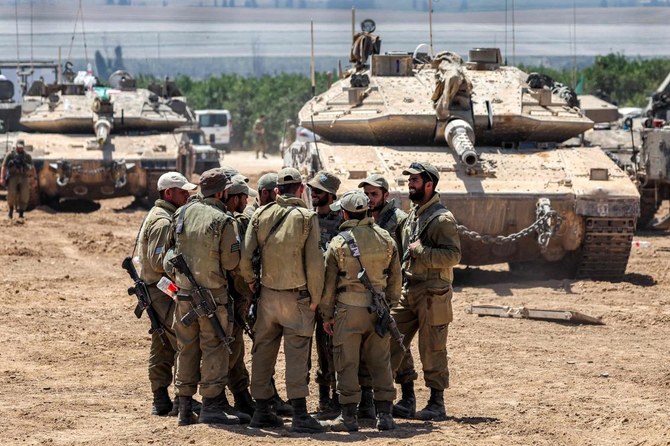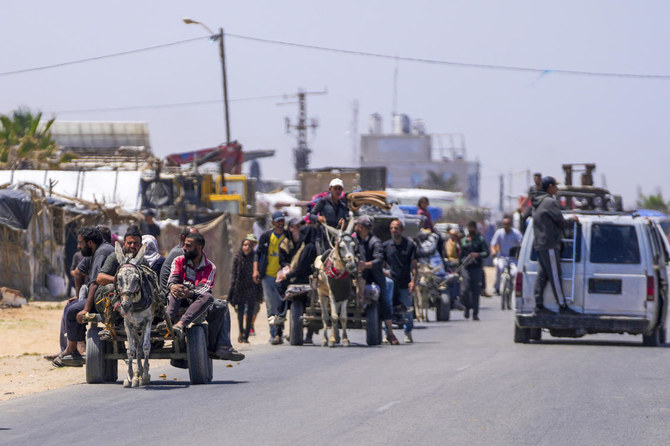CAIRO/RAFAH/WASHINGTON: Israeli tanks and warplanes bombarded areas of Rafah on Thursday, Palestinian residents said, after President Joe Biden said the United States would withhold weapons from Israel if its forces mount a major invasion of the southern Gaza city.
A senior Israeli official said that the latest round of indirect negotiations in Cairo to halt hostilities had ended and Israel would proceed with its operation in Rafah and other parts of the Gaza Strip as planned.
Israel has submitted to mediators its reservations about a Hamas proposal for a hostage release deal and the Israeli delegation was returning from the Egyptian capital, the official added.
In Gaza, Palestinian militant groups Hamas and Islamic Jihad said their fighters fired anti-tank rockets and mortars at Israeli tanks massed on the eastern outskirts of the city.
Residents and medics in Rafah, the biggest urban area in Gaza not yet overrun by Israeli ground forces, said an Israeli attack by a mosque killed at least three people and wounded others in the eastern Brazil neighborhood.
Video footage from the scene showed the minaret lying in the rubble, two bodies wrapped in blankets and a wounded man being carried away.
On the city’s eastern edge, residents said a helicopter opened fire, while drones hovered above houses in several areas, some close to rooftops.
Israel says Hamas militants are hiding in Rafah, where the population has been swelled by hundreds of thousands of Gazans seeking refuge from bombardments elsewhere in the coastal enclave, and it needs to eliminate them for its own security.
One of the displaced, Mohammad Abder-Rahman, said he feared the Israeli bombardments presaged an invasion of the city.
“It reminds me of what happened before Israeli tanks stormed our residential areas in Gaza City, heavy bombardment usually allows tanks to roll toward places they intend to invade,” the 42-year-old told Reuters via a messaging app.
Ceasefire talks in Egypt’s capital made some headway but no deal was reached, according to two Egyptian security sources.
The Hamas delegation left for Doha for consultations, blaming Israel for the lack of agreement so far.
Israel has said it is open to a truce, but has rejected demands for an end to the war as it has vowed to demolish Hamas.
Biden, who says Israel has not produced a convincing plan to safeguard civilians in Rafah, issued his starkest warning yet against a full ground invasion.
“I made it clear that if they go into Rafah, ... I’m not supplying the weapons,” Biden told CNN in an interview on Wednesday.
Israel’s assault on Gaza has killed nearly 35,000 Palestinians and wounded nearly 80,000, most of them civilians, the health ministry in Hamas-run Gaza said.
It launched its offensive in response to a cross-border attack by Hamas militants on Israel on Oct. 7 in which they killed about 1,200 people and abducted 252. Some 128 hostages remain in Gaza and 36 have been declared dead, according to the latest Israeli figures.
80,000 PALESTINIANS FLEE AGAIN THIS WEEK
On Tuesday, Israeli tanks seized the Gaza side of the Rafah border crossing with Egypt on Tuesday, cutting off a vital aid route and forcing 80,000 people to flee the city this week, according to the United Nations.
“The toll on these families is unbearable. Nowhere is safe,” the UN agency for Palestinian refugees said in a post on X.
An Israeli military statement on Gaza operations on Thursday morning did not refer to Rafah.
The United States is by far the biggest supplier of weapons to Israel, and it accelerated deliveries after the Hamas attacks on Oct. 7 that triggered Israel’s offensive in Gaza. Biden acknowledged that US bombs have killed Palestinian civilians in the seven-month-old offensive.
US officials have said Washington paused delivery of a shipment of 1,800 2,000-pound bombs and 1,700 500-pound bombs to Israel because of the risk to civilians in Gaza.
Israel’s United Nations ambassador Gilad Erdan said the US decision to pause some weapons deliveries to Israel would significantly impair the country’s ability to neutralize Hamas’ power, according to Israeli public radio.
But Defense Minister Yoav Gallant told Israel’s “enemies and friends” it would do whatever necessary achieve its war aims in Gaza, underlining the scale of the standoff.
Israel kept up tank and aerial strikes across Gaza and tanks advanced in the Zeitoun neighborhood of Gaza City in the north, forcing hundreds of families to flee, residents said. The Israeli military said it was securing Zeitoun, starting with a series of intelligence-based aerial strikes on approximately 25 “terror targets.”
Deir Al-Balah in central Gaza was heaving with people who had fled Rafah in recent days. Palestinian medics said two people, including a woman, were killed when a drone fired a missile at a group of people there.
CIA DIRECTOR SHUTTLES BETWEEN JERUSALEM AND CAIRO
In Cairo, delegations from Hamas, Israel, the US, Egypt and Qatar had been meeting since Tuesday. CIA Director William Burns has shuttled between Cairo and Jerusalem, meeting Israeli Prime Minister Benjamin Netanyahu on Wednesday.
Izzat El-Risheq, a member of Hamas’ political office in Qatar, said the Hamas delegation had left Cairo, having reaffirmed its approval the mediators’ ceasefire proposal. The plan entails the release of Israeli hostages held captive in Gaza and a number of Palestinians jailed by Israel.
MEDICAL SECTOR COLLAPSED
The closure of the Rafah crossing with Egypt has prevented the evacuation of the wounded and sick and the entry of medical supplies, food trucks and fuel needed to operate hospitals, the Gaza health ministry said on Thursday.
The only kidney dialysis center in the Rafah area had stopped operating due to the shelling.
“There used to be medical aid coming in, and now there is no medical aid,” said Ali Abu Khurma, a Jordanian surgeon volunteering at Al Aqsa hospital in Deir Al-Balah.
“The entire medical sector has collapsed.”



























